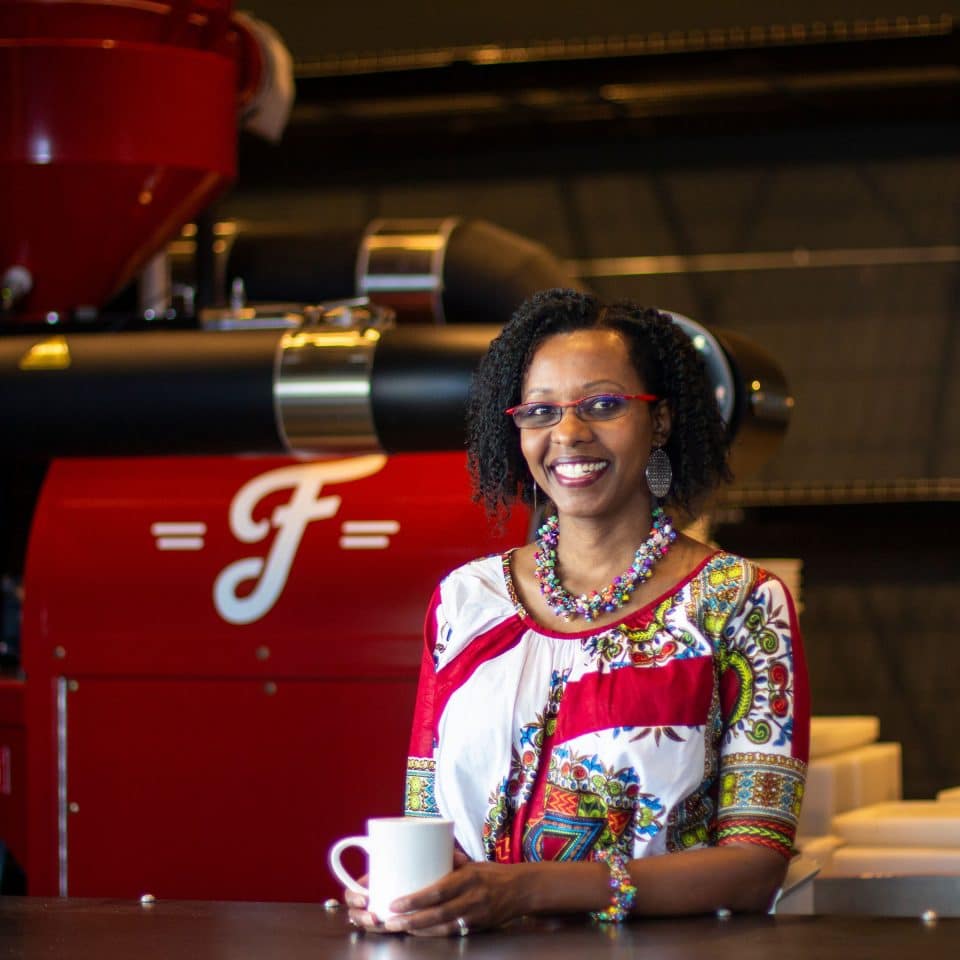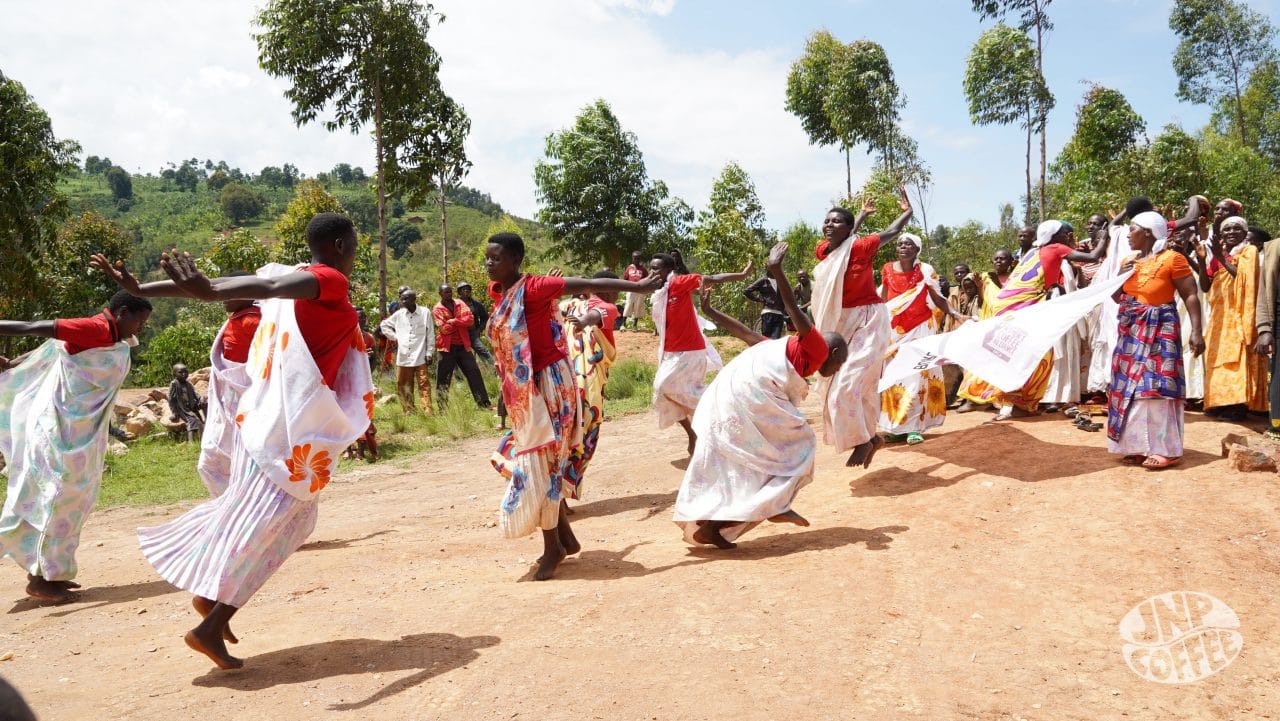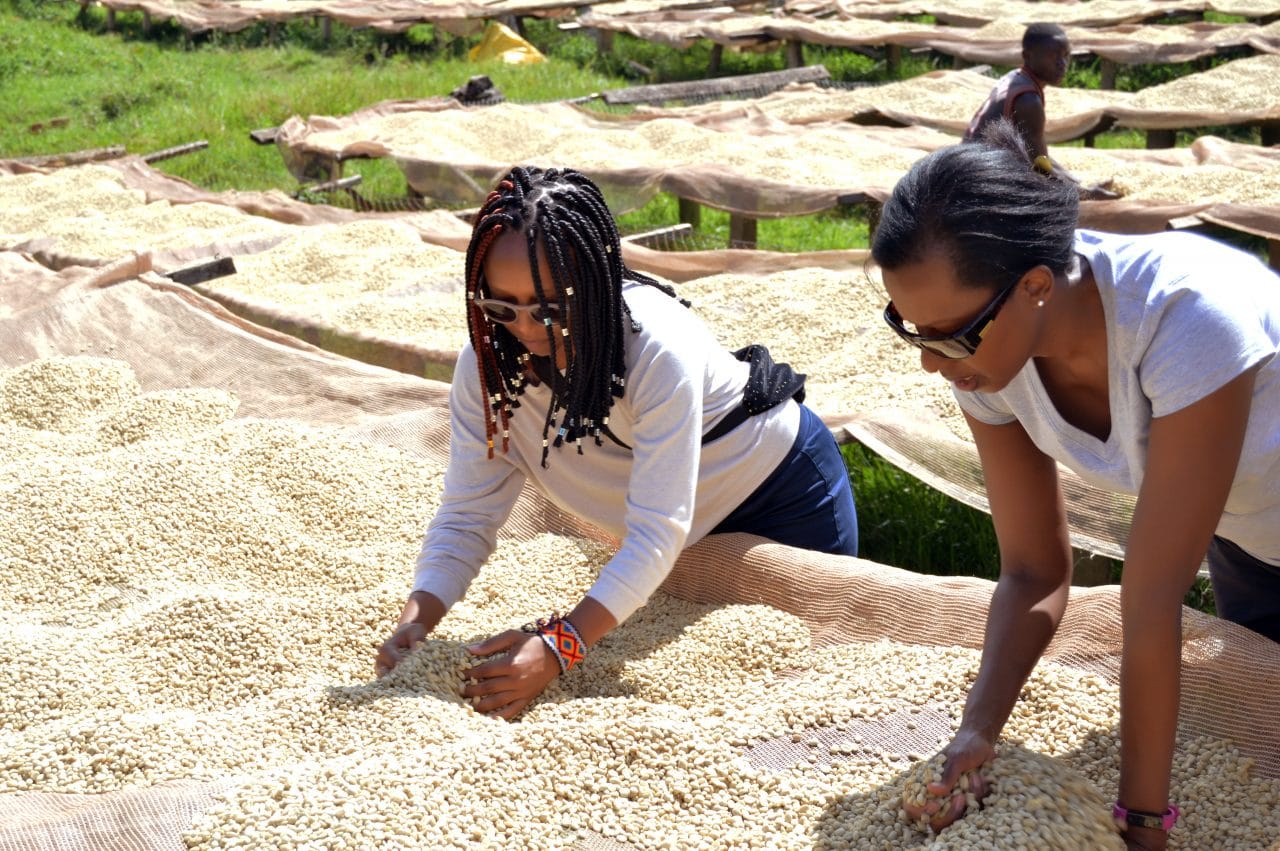As we celebrate Women’s History Month, we reflect on the many incredible women we work with throughout the supply stream—from strong leaders within our team to our wonderful partners whose work continually inspires us. One such partner we’re proud to work with is Jeanine Niyonzima-Aroian, owner of JNP Coffee, an importing company focusing on promoting and trading African specialty coffee.
We first met Jeanine at the New York Coffee Festival in October 2019 and her work in gender equity in Burundi resounded with us deeply. Soon after, we released a coffee from JNP Coffee to our Atlas Collection, a special line of coffees which aims to highlight each of our sourcing values. This coffee, from the Karehe Washing Station, was chosen to represent our sourcing value of ethics for the many ways it spoke to Jeanine’s work to uplift and empower the communities where she works in Burundi. A year later, we’re excited to welcome another coffee through JNP, Turihamwe IWCA, to our Atlas Collection later this month.
In anticipation of this upcoming release and in celebration of Women’s History Month, we present this interview with Jeanine.

Hi Jeanine! Thank you so much for speaking with us. Can you introduce yourself?
My name is Jeanine Niyonzima-Aroian, owner of JNP Coffee and founder of Burundi Friends International.
After a 20-year career in international business, what led you back to Burundi, and ultimately into the coffee industry?
Initially, what led me back to Burundi was a calling to give my people a helping hand. I was one of the fortunate ones who left the country to secure a higher education and was blessed with a great career. Burundi is one of the poorest countries on the planet. I knew I needed to do something. Through the non-profit, Burundi Friends International (BFI) that I founded in 2008 while living and working in California, we were able to empower women, youth and families to build self-sustaining communities. What started with teaching English Communications classes for youth that didn’t have the money to attend college has grown to serve more than 75,000 students across all provinces in Burundi. They have six container-libraries, dozens of smaller libraries (mostly in schools) and 1,000 English Clubs, plus full college scholarships for more than 40 students in Burundi.
Like many, I stumbled into coffee by accident. On my trip to Burundi with the BFI board in 2010, I met the head of USAID who insisted that I consider the coffee industry. Later on, I ran into my cousin who was in coffee. He had just built a wet mill and asked me to help him. Then women farmers and members of IWCA Burundi, who had received goats through a BFI project, approached me to buy and market their coffee. Before too long, I found myself as a shareholder in several wet mills in Burundi. I took the opportunity to promote quality coffee with high premiums (a second payment to farmers), then collaborated with NGOs like PCI Global and BFI to bring financial literacy to farmers. Each step brought another element of sustainability to the model we established.
Growing up in Burundi, was coffee always part of your life?
Not at all. Tea is the culture. Coffee is a cash crop for farmers in Burundi. Most of them can’t actually afford a cup of coffee!
What is JNP Coffee’s mission? Do you work exclusively with the IWCA (International Women’s Coffee Alliance) chapter in Burundi?
JNP Coffee’s mission is to use coffee to alleviate poverty in Burundi, to share Burundi’s exceptionally delicious coffee with the world, to educate and empower farmers, and to build sustainable communities through coffee. And no, we don’t work exclusively with the IWCA Burundi Chapter, although in 2018, JNP Coffee underwrote 100% of their production. Some of our current successful programs, like that of “Turihamwe Turashobora” coffees were with the farmers who were founding members of the IWCA Burundi Chapter.

What are some of the biggest challenges that women in coffee face in Burundi?
Lack of access to land ownership, lack of education, and lack of opportunities in general.
JNP Coffee is known for enabling gender-sensitive development strategies at origin. What does this mean?
Through my mother, I learned quickly at an early age that if you empower a woman, you have a chance to improve the future of a family. When you empower a woman in a place like Burundi, you ensure that funds will go to feed the children and take care of the needs in the home. Women will share their knowledge with other women to improve the community’s quality of life. In our women’s savings and microlending program with BFI, the repayment rate is almost 100%. I can go on and on. Even in large US corporations, those with women in leadership perform better than their counterparts.
How do you think supporting gender equity impacts the sustainability of the industry?
I don’t see any other way. In places like Burundi, women are the ones working the land, taking care of the coffee trees among other crops. If we want to sustain the coffee industry, we need to emphasize quality, pay good money for it, and bring in other programs to allow farmers to diversify their crops and income, in addition to education. Also, in places like Burundi, contrary to countries like Brazil, the harvest is small and with the right support, the opportunity to produce mostly specialty grade-coffee every year is very attainable.
JNP Coffee emphasizes the power and importance of partnership to support inclusive economic growth. Can you tell us a little bit about your work to promote financial literacy among women coffee growers?
Education is critically important to economic development yet significantly lacking in Africa. In Burundi, less than 2% of the population has access to higher education. For most people, it’s not a lack of willingness or capability, but a lack of opportunity. I use every opportunity I have to bring education home, at origin. Through BFI, in collaboration with PCI Global, we have been able to bring a very impactful financial literacy program to women farmers, now expanded to youth in Burundi. The program provides a space where women can meet to learn about leadership, and a platform for saving and lending to each other. Some of the women farmers in the program pooled their resources and went on to start their own wet mill in 2019. They are now producing an exceptional coffee, like Turihamwe. To me, that is a good example of an inclusive economy, where women coffee farmers can build and own their own wet mill.
How do you measure the impact of implementing equitable practices at origin? Is this something you’ve found challenging?
We measure the impact of implementing equitable practices at origin through the example of the women of Turihamwe Turashobora group. By providing access to education, financial resources and leadership, women farmers could build and manage their own wet mill, and the cup quality also speaks for itself. It’s been very challenging in a place like Burundi, where women traditionally don’t have a voice. I struggle with it myself throughout the supply chain, but it does not stop me from persisting. It is a must in Burundi, where women are an untapped resource with tremendous potential.

Can you tell us about your experience as a Black woman in specialty coffee? How does it compare to your experience as a Black woman working with producers in Burundi?
I love being a Black woman in coffee. This is where I belong. I can represent my fellow women farmers in Burundi right here in the consuming country. However, this does not make it any easier doing business as a Black woman in America. I face the same discrimination as any other Black person in the US, but when I go home to Burundi, the farmers of Burundi are my people and I owe them everything to represent them well. That said, I still face the same gender prejudice and inequality as a businesswoman in Africa. However, I view it as an opportunity to be a role model for other women in Africa, America and the world.
What can you tell us about our upcoming release, Turihamwe IWCA, and the women who produced this coffee?
Turihamwe coffee is a perfect example of an important story. Women farmers who were IWCA members got together, saved their money as they learned to do in our financial literacy program, and then built and started their own wet mill operation in 2019. Now they are producing a coffee that is outperforming many others. That’s why in Kirundi, its name means “together.” Indeed, together, we can succeed and make a difference. Thank you for allowing us this opportunity.
All photos courtesy of JNP Coffee
